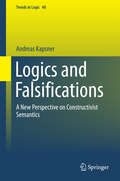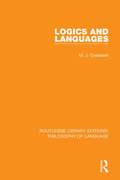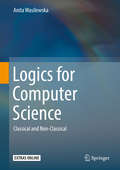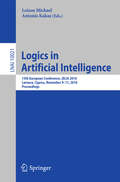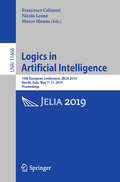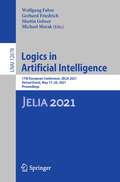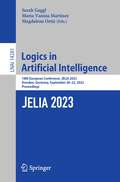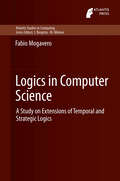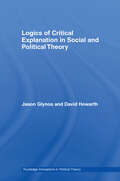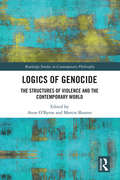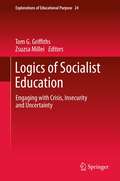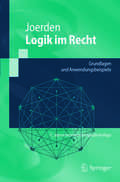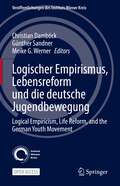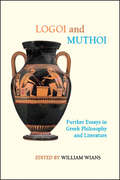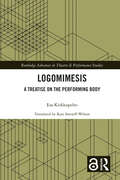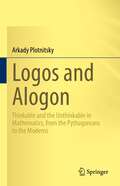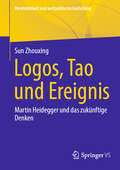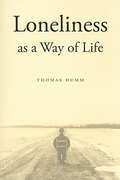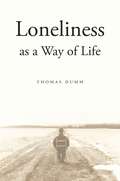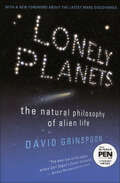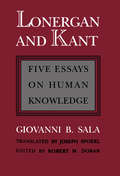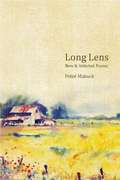- Table View
- List View
Logics and Falsifications
by Andreas KapsnerThis volume examines the concept of falsification as a central notion of semantic theories and its effects on logical laws. The point of departure is the general constructivist line of argument that Michael Dummett has offered over the last decades. From there, the author examines the ways in which falsifications can enter into a constructivist semantics, displays the full spectrum of options, and discusses the logical systems most suitable to each one of them. While the idea of introducing falsifications into the semantic account is Dummett's own, the many ways in which falsificationism departs quite radically from verificationism are here spelled out in detail for the first time. The volume is divided into three large parts. The first part provides important background information about Dummett's program, intuitionism and logics with gaps and gluts. The second part is devoted to the introduction of falsifications into the constructive account and shows that there is more than one way in which one can do this. The third part details the logical effects of these various moves. In the end, the book shows that the constructive path may branch in different directions: towards intuitionistic logic, dual intuitionistic logic and several variations of Nelson logics. The author argues that, on balance, the latter are the more promising routes to take. "Kapsner's book is the first detailed investigation of how to incorporate the notion of falsification into formal logic. This is a fascinating logico-philosophical investigation, which will interest non-classical logicians of all stripes. " Graham Priest, Graduate Center, City University of New York and University of Melbourne
Logics and Languages
by M. J. CresswellOriginally published in 1973, this book shows that methods developed for the semantics of systems of formal logic can be successfully applied to problems about the semantics of natural languages; and, moreover, that such methods can take account of features of natural language which have often been thought incapable of formal treatment, such as vagueness, context dependence and metaphorical meaning. Parts 1 and 2 set out a class of formal languages and their semantics. Parts 3 and 4 show that these formal languages are rich enought to be used in the precise description of natural languages. Appendices describe some of the concepts discussed in the text.
Logics for Computer Science: Classical And Non-classical
by Anita WasilewskaProviding an in-depth introduction to fundamental classical and non-classical logics, this textbook offers a comprehensive survey of logics for computer scientists. Logics for Computer Science contains intuitive introductory chapters explaining the need for logical investigations, motivations for different types of logics and some of their history. They are followed by strict formal approach chapters. All chapters contain many detailed examples explaining each of the introduced notions and definitions, well chosen sets of exercises with carefully written solutions, and sets of homework. While many logic books are available, they were written by logicians for logicians, not for computer scientists. They usually choose one particular way of presenting the material and use a specialized language. Logics for Computer Science discusses Gentzen as well as Hilbert formalizations, first order theories, the Hilbert Program, Godel's first and second incompleteness theorems and their proofs. It also introduces and discusses some many valued logics, modal logics and introduces algebraic models for classical, intuitionistic, and modal S4 and S5 logics.The theory of computation is based on concepts defined by logicians and mathematicians. Logic plays a fundamental role in computer science, and this book explains the basic theorems, as well as different techniques of proving them in classical and some non-classical logics. Important applications derived from concepts of logic for computer technology include Artificial Intelligence and Software Engineering. In addition to Computer Science, this book may also find an audience in mathematics and philosophy courses, and some of the chapters are also useful for a course in Artificial Intelligence.
Logics in Artificial Intelligence
by Loizos Michael Antonis KakasThis book constitutes the proceedings of the 15th European Conference on Logics in Artificial Intelligence, JELIA 2016, held in Larnaca, Cyprus, in November 2015. The 32 full papers and 10 short papers included in this volume were carefully reviewed and selected from 88 submissions. The accepted papers span a number of areas within Logics in AI, including: belief revision, answer set programming, argumentation, probabilistic reasoning, handling inconsistencies, temporal logics and planning, description logics, and decidability and complexity results.
Logics in Artificial Intelligence: 16th European Conference, JELIA 2019, Rende, Italy, May 7–11, 2019, Proceedings (Lecture Notes in Computer Science #11468)
by Francesco Calimeri Nicola Leone Marco MannaThis book constitutes the proceedings of the 16th European Conference on Logics in Artificial Intelligence, JELIA 2019, held in Rende, Italy, in May 2019. The 50 full papers and 10 short papers included in this volume were carefully reviewed and selected from 101 submissions. Additionally, the book contains 3 invited papers. The accepted papers span a number of areas within Logics in AI, including: belief revision and argumentation; causal, defeasible and inductive reasoning; conditional, probabilistic and propositional logic; description logics; logic programming; modal and default logic; and temporal logic.
Logics in Artificial Intelligence: 17th European Conference, JELIA 2021, Virtual Event, May 17–20, 2021, Proceedings (Lecture Notes in Computer Science #12678)
by Gerhard Friedrich Wolfgang Faber Martin Gebser Michael MorakThis book constitutes the proceedings of the 17th European Conference on Logics in Artificial Intelligence, JELIA 2021, held as a virtual event, in May 2021. The 27 full papers and 3 short papers included in this volume were carefully reviewed and selected from 68 submissions. The accepted papers span a number of areas within Logics in AI, including: argumentation; belief revision; reasoning about actions, causality, and change; constraint satisfaction; description logics and ontological reasoning; non-classical logics; and logic programming (answer set programming).
Logics in Artificial Intelligence: 18th European Conference, JELIA 2023, Dresden, Germany, September 20–22, 2023, Proceedings (Lecture Notes in Computer Science #14281)
by Maria Vanina Martinez Magdalena Ortiz Sarah GagglThis book constitutes proceedings of the 18th European Conference on Logics in Artificial Intelligence, JELIA 2023, held in Dresden, Germany, in September 2023.The 41 full papers and 11 short papers included in this volume were carefully reviewed and selected from 111 submissions. The accepted papers span a number of areas within Logics in AI, including: argumentation; belief revision; reasoning about actions, causality, and change; constraint satisfaction; description logics and ontological reasoning; non-classical logics; and logic programming (answer set programming).
Logics in Computer Science: A Study on Extensions of Temporal and Strategic Logics
by Fabio MogaveroIn this monograph we introduce and examine four new temporal logic formalisms that can be used as specification languages for the automated verification of the reliability of hardware and software designs with respect to a desired behavior. The work is organized in two parts. In the first part two logics for computations, the graded computation tree logic and the computation tree logic with minimal model quantifiers are discussed. These have proved to be useful in describing correct executions of monolithic closed systems. The second part focuses on logics for strategies, strategy logic and memoryful alternating-time temporal logic, which have been successfully applied to formalize several properties of interactive plays in multi-entities systems modeled as multi-agent games.
Logics of Critical Explanation in Social and Political Theory (Routledge Innovations in Political Theory #Vol. 26)
by David Howarth Jason GlynosThis book proposes a novel approach to practising social and political analysis based on the role of logics. The authors articulate a distinctive perspective on social science explanation that avoids the problems of scientism and subjectivism by steering a careful course between lawlike explanations and thick descriptions. Drawing upon hermeneutics, poststructuralism, psychoanalysis, and post-analytical philosophy, this new approach offers a particular set of logics – social, political and fantasmatic – with which to construct critical explanations of practices and regimes. While the first part of the book critically engages with lawlike, interpretivist and causal approaches to critical explanation, the second part elaborates an alternative grammar of concepts informed by an ontological stance rooted in poststructuralist theory. In developing this approach, a number of empirical cases are included to illustrate its basic concepts and logics, ranging from the apartheid regime in South Africa to recent changes in higher education. The book will be a valuable tool for scholars and researchers in a variety of related fields of study in the social sciences, especially the disciplines of political science and political theory, international relations, social theory, cultural studies, anthropology and philosophy.
Logics of Disintegration: Post-Structuralist Thought and the Claims of Critical Theory
by Peter DewsThis book examines the relationship between post-structuralism and Frankfurt School critical theory. It also questions the "novelty" of post-structuralist claims, using, for instance, the debate between Fichte and Schelling to show that such terrain as radical subjectivity has been broached before. The book explores the danger of allowing post-structuralism to remain unchecked and the possible "disastrous" political consequences of such a "radical" theory.
Logics of Genocide: The Structures of Violence and the Contemporary World (Routledge Studies in Contemporary Philosophy)
by Martin Shuster Anne O’ByrneThis book is concerned with the connection between the formal structure of agency and the formal structure of genocide. The contributors employ philosophical approaches to explore the idea of genocidal violence as a structural element in the world. Do mechanisms or structures in nation-states produce types of national citizens that are more susceptible to genocidal projects? There are powerful arguments within philosophy that in order to be the subjects of our own lives, we must constitute ourselves specifically as national subjects and organize ourselves into nation states. Additionally, there are other genocidal structures of human society that spill beyond historically limited episodes. The chapters in this volume address the significance—moral, ethical, political—of the fact that our very form of agency suggests or requires these structures. The contributors touch on topics including birthright citizenship, contemporary mass incarceration, anti-black racism, and late capitalism. Logics of Genocide will be of interest to scholars and advanced students working in philosophy, critical theory, genocide studies, Holocaust and Jewish studies, history, and anthropology.
Logics of Socialist Education
by Zsuzsa Millei Tom G. GriffithsFor some, socialism is a potent way of achieving economic, political and social transformations in the twenty-first century, while others find the very term socialism outdated. This book engages readers in a discussion about the viability of socialist views on education and identifies the capacity of some socialist ideas to address a range of widely recognized social ills. It argues that these pervasive social problems, which plague so-called 'developed' societies as much as they contribute to the poverty, humiliation and lack of prospects in the rest of the world, fundamentally challenge us to act. In our contemporary world-system, distancing ourselves from the injustices of others is neither viable nor defensible. Rather than waiting for radically new solutions to emerge, this book sees the possibility of transformation in the reconfiguration of existing social logics that comprise our modern societies, including logics of socialism. The book presents case studies that offer a critical examination of education in contemporary socialist contexts, as well as reconsidering examples of education under historical socialism. In charting these alternatives, and retooling past solutions in a nuanced way, it sets out compelling evidence that it is possible to think and act in ways that depart from today's dominant educational paradigm. It offers contemporary policy makers, researchers, and practitioners a cogent demonstration of the contemporary utility of educational ideas and solutions associated with socialism. A pioneering collection of essays which is central to understanding the historical and contemporary meanings of socialism in the context of neoliberal globalization. It is a most timely contribution to a growing intellectual project that challenges the hegemony of capitalism, while re-thinking and theorizing alternatives. Iveta Silova, Associate Professor of Comparative Education, Lehigh University, Bethlehem, PA, USA In this significant contribution to recent scholarship the authors use the lens of socialist education to offer an original critique of hegemonic capitalism, and present an intellectually rigorous search for alternatives by reconsidering historical socialism and advancing promising educational experiments that challenge the 'global architecture of education'. Anders Breidlid, Professor of International Education and Development, Oslo University College, Norway
Logik im Recht
by Jan C. JoerdenIn dem Lehr- und Studienbuch zeigt der Autor, in welchem Maße logische Strukturen das Rechtsdenken bestimmen. Er erläutert die wesentlichen logischen Grundlagen und ihre Anwendung auf dem Gebiet des Rechts. Zum einen führt dies zu einem tieferen Verständnis der juristischen Dogmatik und einer systematischen Durchdringung des Rechtsstoffs, zum anderen tragen die Überlegungen zwischen Logik und Rechtswissenschaft zu neuen Erkenntnissen bei. Behandelt werden verschiedene Strukturen des Rechts, u. a. relationenlogische und syllogistische Strukturen.
Logischer Empirismus, Lebensreform und die deutsche Jugendbewegung: Logical Empiricism, Life Reform, and the German Youth Movement (Veröffentlichungen des Instituts Wiener Kreis #32)
by Christian Damböck Günther Sandner Meike G. WernerThis open-access book is the first to investigate the roots of Logical Empiricism in the context of the Life Reform and the German Youth Movements. Rudolf Carnap and Hans Reichenbach are the key protagonists; they both belonged to the German Youth Movement and developed their early philosophical views in this setting. By combining scholarly essays with unpublished and hard to access manuscripts, letters, and articles, this volume recasts our understanding of the early years of Logical Empiricism.
Logoi and Muthoi: Further Essays in Greek Philosophy and Literature (SUNY series in Ancient Greek Philosophy)
by William WiansIn Logoi and Muthoi, William Wians builds on his earlier volume Logos and Muthos, highlighting the richness and complexity of these terms that were once set firmly in opposition to one another as reason versus myth or rationality versus irrationality. It was once common to think of intellectual history representing a straightforward progression from mythology to rationality. These volumes, however, demonstrate the value of taking the two together, opening up and analyzing a range of interactions, reactions, tensions, and ambiguities arising between literary and philosophical forms of discourse, including philosophical themes in works not ordinarily considered in the canon of Greek philosophical texts. This new volume considers such topics as the pre-philosophical origins of Anaximander's calendar, the philosophical significance of public performance and claims of poetic inspiration, and the complex role of mythic figures (including perhaps Socrates) in Plato. Taken together, the essays offer new approaches to familiar texts and open up new possibilities for understanding the roles and relationships between muthos and logos in ancient Greek thought.
Logomimesis: A Treatise On The Performing Body (Routledge Advances in Theatre & Performance Studies)
by Esa KirkkopeltoHow can the dichotomy between body and language be overcome by means of the performing arts? What does the art of performing contribute to philosophical, ethical, and political thinking today?This book is a study of the body and language on the stage. Inspired by contemporary artistic research and performance philosophy, Esa Kirkkopelto proposes a new understanding of embodiment that has no direct counterpart in existing philosophies of the body, in natural science, or in everyday experience. The way a performer imagines their body in performance breaks with body–language dichotomies, so language and body can be conceived as co-original phenomena, beyond their anthropomorphic framing. Once we recognize the native relationship between body and language, we can acquire an evolutive perspective which reaches beyond ontological or transcendental paradigms, towards a more linguistic and corporeal coexistence of diverse beings.This book shows how radically different the universe appears when conceived through the performing body. It addresses artists and philosophers alike.
Logos and Alogon: Thinkable and the Unthinkable in Mathematics, from the Pythagoreans to the Moderns
by Arkady PlotnitskyThis book is a philosophical study of mathematics, pursued by considering and relating two aspects of mathematical thinking and practice, especially in modern mathematics, which, having emerged around 1800, consolidated around 1900 and extends to our own time, while also tracing both aspects to earlier periods, beginning with the ancient Greek mathematics. The first aspect is conceptual, which characterizes mathematics as the invention of and working with concepts, rather than only by its logical nature. The second, Pythagorean, aspect is grounded, first, in the interplay of geometry and algebra in modern mathematics, and secondly, in the epistemologically most radical form of modern mathematics, designated in this study as radical Pythagorean mathematics. This form of mathematics is defined by the role of that which beyond the limits of thought in mathematical thinking, or in ancient Greek terms, used in the book’s title, an alogon in the logos of mathematics. The outcome of this investigation is a new philosophical and historical understanding of the nature of modern mathematics and mathematics in general. The book is addressed to mathematicians, mathematical physicists, and philosophers and historians of mathematics, and graduate students in these fields.
Logos, Tao und Ereignis: Martin Heidegger und das zukünftige Denken (Persönlichkeit und weltpolitische Gestaltung)
by Sun ZhouxingDie Begriffe Logos, Tao und Ereignis stehen im Zentrum dieser Aufsatzsammlung, die sich auf das künftige Denken im Ausgang von Martin Heideggers Philosophie unter der Voraussetzung der Geschichtlichkeit des Seins und unter Einbezug der multikulturellen Ressourcen der Menschheit bezieht. Unter den philosophischen Diskursen des 20. Jahrhunderts ist Heideggers Ereignis wahrscheinlich das rätselhafteste. Der Autor hat diese acht Aufsätze, die erstmals in deutscher Sprache erscheinen, auf verschiedene Art und Weise überarbeitet, erweitert und verbessert sowie inhaltlich und formal vereinheitlicht. So erhält eine Heidegger-Interpretation aus chinesischer Perspektive Eingang in die Wirkungs- und Rezeptionsgeschichte des deutschen Philosophen.
Loneliness as a Way of Life
by Thomas DummThe modern individual, Dumm suggests, is fundamentally a lonely self. Through reflections on philosophy, political theory, literature, and tragic drama, he proceeds to illuminate a hidden dimension of the human condition.
Loneliness as a Way of Life
by Thomas Dumm“What does it mean to be lonely?” Thomas Dumm asks. His inquiry, documented in this book, takes us beyond social circumstances and into the deeper forces that shape our very existence as modern individuals. The modern individual, Dumm suggests, is fundamentally a lonely self. Through reflections on philosophy, political theory, literature, and tragic drama, he proceeds to illuminate a hidden dimension of the human condition. His book shows how loneliness shapes the contemporary division between public and private, our inability to live with each other honestly and in comity, the estranged forms that our intimate relationships assume, and the weakness of our common bonds. A reading of the relationship between Cordelia and her father in Shakespeare’s King Lear points to the most basic dynamic of modern loneliness—how it is a response to the problem of the “missing mother.” Dumm goes on to explore the most important dimensions of lonely experience—Being, Having, Loving, and Grieving. As the book unfolds, he juxtaposes new interpretations of iconic cultural texts—Moby-Dick, Death of a Salesman, the film Paris, Texas, Emerson’s “Experience,” to name a few—with his own experiences of loneliness, as a son, as a father, and as a grieving husband and widower. Written with deceptive simplicity, Loneliness as a Way of Life is something rare—an intellectual study that is passionately personal. It challenges us, not to overcome our loneliness, but to learn how to re-inhabit it in a better way. To fail to do so, this book reveals, will only intensify the power that it holds over us.
Lonely Planets: The Natural Philosophy of Alien Life
by David GrinspoonPEN Literary Award Winner: &“The best, most entertaining examination of the possibility of other life in the universe since [Carl] Sagan&’s best work.&” —Boulder Daily Camera It&’s been decades since Carl Sagan first addressed the general public about the possibility of extraterrestrial life from a scientist&’s perspective. We&’ve learned a lot in those years, and now planetary scientist David Grinspoon investigates the big questions: How widespread are life and intelligence in the cosmos? Is life on Earth an accident, or in some sense the &“purpose&” of this universe? And how can we, working from the Earth-centric definition of &“life,&” even begin to think about the varieties of life-forms on other planets? In accessible, lively prose, and using the topic of extraterrestrial life as a mirror with which to view human beliefs, evolution, history, and aspirations, Grinspoon takes us on a three-part journey—the history of our expanding awareness of other planets and our ideas on alien life dating back to the earliest days of astronomy; the science of cosmic evolution and the evolution of life on Earth, including a critique of the &“Rare Earth hypothesis&”; and the beliefs that humans hold, addressing the limits of our ability to conceptualize or communicate with intelligent aliens and the scientific and philosophical implications of far-future evolutionary possibilities. Rich in personal and often amusing anecdotes, Lonely Planets explores the shifting boundary between planetary science and natural philosophy, and reveals how the search for extraterrestrial life unites our spiritual and scientific quests for connection with the cosmos. Includes a new foreword about recent Mars discoveries &“An outstanding introduction to cosmic evolution.&” —San Jose Mercury News &“[A] terrific book.&” —San Diego Union-Tribune &“A personable chat on life, the universe and everything.&” —Publishers Weekly
Lonergan and Kant
by Giovanni B. SalaLonergan's Insight has frequently been compared with Kant's Critique of Pure Reason. Giovanni B. Sala, an internationally acknowledged Kant scholar, contrasts the cognitional theory of his former teacher Lonergan with the positions of Kant that have proved so influential, and in many ways so intractable, over the past two centuries.The first essay is one of the most influential papers ever written on Lonergan; it and the second one inquire into the notion of the a priori. The third essay presents a detailed analysis of Kantian intuitionism and contrasts it with the `knowledge as structure' position of Lonergan's critical realism. In this essay intuitionism is generalized, to allow Sala to address representatives of neoscholasticism as well. The argument with neoscholasticism continues in the fourth essay. The final paper discusses Kant's resolution of the question regarding the agreement of a priori concepts with things, and finds in Lonergan's work an alternative position on correspondence and truth. Each essay is a model of careful and thorough scholarship, and also - surprising in a book of such proportions - of clarity. Lonergan appeals several times in Insight to the device of `Clarification by Contrast.' Sala's essays show us in intricate detail how illuminating such comparisons can be.
Lonergan in the World
by James MarshIn his philosophical classic Insight, Catholic philosopher and theologian Bernard Lonergan introduced the concept of self-appropriation - the personal search for knowledge of the self, and through that of the world - as the basis for systematic philosophical investigation.In Lonergan in the World, James L. Marsh argues, clearly and passionately, that self-appropriation can serve as the basis for philosophical, ethical, and even political and economic thought. Comparing and applying Lonergan's principles to major trends in contemporary philosophy, including phenomenology, hermeneutics, postmodernism, analytic philosophy, and Marxism, Marsh uncovers the philosophical and the socio-political implications of Lonergan's work and its value as the basis for a search for justice and self-understanding.Drawing on Marsh's more than forty years of studying and teaching Lonergan's thought, Lonergan in the World is a book that should be read not just by philosophers and theologians, but by anyone interested in the philosophical foundations of a just and authentic life.
Lonergan on Philosophic Pluralism
by Gerard WalmsleyIn his influential philosophical work Insight, Bernard Lonergan made the intriguing and problematic claim that "the polymorphism of consciousness is the one and only key to philosophy." In Lonergan on Philosophical Pluralism, Gerard Walmsley examines Lonergan's many discussions of the different forms of human consciousness, as well as his sustained responses to the problems raised by philosophical and cultural pluralism. Looking closely at Lonergan's thoughts on patterns of experience, different levels of consciousness, and the differentiations of consciousness that occur through the historical development of individual human minds, Walmsley shows how polymorphic consciousness allows individuals to understand a range of philosophical positions. By understanding this range, an individual is able to sympathetically and critically appreciate different positions. Testing the strength of Lonergan's position, he directly engages postmodern thought and comparative philosophy to demonstrate that Lonergan's account of polymorphic consciousness provides a better basis for a positive evaluation of difference than does the work of many postmodern thinkers. An ambitious and soundly argued work, Lonergan on Philosophical Pluralism is both an illuminating study of Lonergan's thought, and an intriguing proposal for how difference and pluralism can be understood.
Long Lens
by Peter Makuck"Peter Makuck sees through the detritus of daily life to what matters. . . . It's that essence that lives deep down in things, looked for in people, sea- and landscapes, and creatures, that lifts the quotidian toward the marvelous, and animates this selection of poems from four decades."--Brendan GalvinFrom "Long Lens":Folding laundry, I can see our clotheslinewaving its patches of color like the flagof a foreign country where I had happily livedin a small clapboard house surrounded by pines.I can hear my mother in her strong accentsaying she didn't want a dryereven when we could finally afford one--Our sheets won't smell of trees and sunlight anymore.Long Lens represents forty years of Peter Makuck's work, including twenty-five new poems. With precise language, Makuck's imagery evokes spiritual longing, love, loss, violence, and transcendence. His subjects include the aftermath of the 1970 killings at Kent State University; scuba diving on an offshore shipwreck; flying through a storm in a small plane; rescuing a boy caught in a riptide; and lucid observations of spinner sharks, a gray fox, a spider, and a pelican tangled in a fishing line.Peter Makuck taught at East Carolina University from 1976 to 2006, where he founded Tar River Poetry. He was 2008 Lee Smith Chair in Creative Writing at North Carolina State University. Winner of the Brockman Award and the Charity Randall Citation, he lives on Bogue Banks, one of North Carolina's barrier islands.
